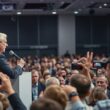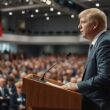Since the South Korean Constitutional Court removed President Yoon Suk-yeol from office on April 4th for violating the constitutional powers of his office, the politician has lost his immunity as President. Although he continued to enjoy immunity from prosecution after his suspension as head of state, this rule did not apply to charges of incitement to rebellion or treason. Therefore, investigations against Yoon for these two charges were already initiated last year.
Before the Constitutional Court concluded the impeachment hearings on February 25th, Yoon stated that his decision to declare martial law was a call to the people to resist hostile forces and sympathizers of the Democratic Workers’ Party of Korea (DPRK) within the opposition ranks. Yoon claimed that he did not intend to permanently declare martial law but rather wanted to raise the alarm. According to Yoon, the opposition Democratic Party abused their parliamentary majority. He accused the opposition of sympathizing with the DPRK and preparing a rebellion.
This week, the trial against the ousted former President began. On Monday, Yoon Suk-yeol appeared before the central district court of Seoul. Yoon is accused of instigating an uprising by declaring martial law on December 3rd, 2024, during which troops were sent to the National Assembly to prevent lawmakers from voting on Yoon’s decree.
At the beginning of the first court hearing, the prosecution stated that Yoon lacked legal grounds for declaring martial law and accused him of wanting to paralyze state institutions such as the parliament. Yoon, who served as the country’s chief prosecutor before becoming President, rejected the prosecution’s allegations. “The indictment merely outlines the details of the investigation during the period between 10:30 PM on December 3rd and 2 to 3 AM the next morning” Yoon said after the prosecution presented a summary of their charges.
According to Yoon, it is against legal principles to construct a case of incitement based on an indictment that looks like “a printout of an incident.” The martial law “lasted only a few hours and was immediately withdrawn” after the parliament demanded its repeal, Yoon added.
However, the prosecution claims that despite the preparations by the President for declaring martial law, he intended to “ignite an uprising” to “undermine the constitution.”
“The martial law is not a coup” Yoon continued. “This was a peaceful ‘message of martial law’ to the nation. I knew that this martial law would end within half a day, one day.”
Yoon said that he had indeed informed his former defense minister, Kim Yong-hyun, of his intentions. However, the military officers who carried out the order apparently went too far, as they were accustomed to training according to other guidelines for implementing martial law.
According to the prosecution, Yoon appointed Kim Yong-hyun, the former head of the National Intelligence Service, as the defense minister in early September 2024, almost three months before declaring martial law, to prepare for its implementation.
However, the former President rejected this accusation and explained that the government must always be prepared for martial law. “For this reason, there is a department among the South Korean Chief of Staffs that deals with martial law. They conduct exercises to implement martial law in case of a possible national emergency” Yoon said.
Two high-ranking officers appeared as witnesses in court in the afternoon. Both testified that they received the order from their superior officer to send troops to “pull out” lawmakers from the parliament during Yoon’s martial law. Yoon also denied this accusation and claimed that he did not issue such an order.
Due to the severity of the offense, Yoon faces additional punishment of the death penalty or life imprisonment. However, South Korea has not carried out any executions since 1997.
The attempt to declare martial law, which lasted about six hours before Yoon withdrew it due to protests, led to the most serious constitutional crisis in South Korea in decades. On June 3rd, early presidential elections will be held in the East Asian country.





